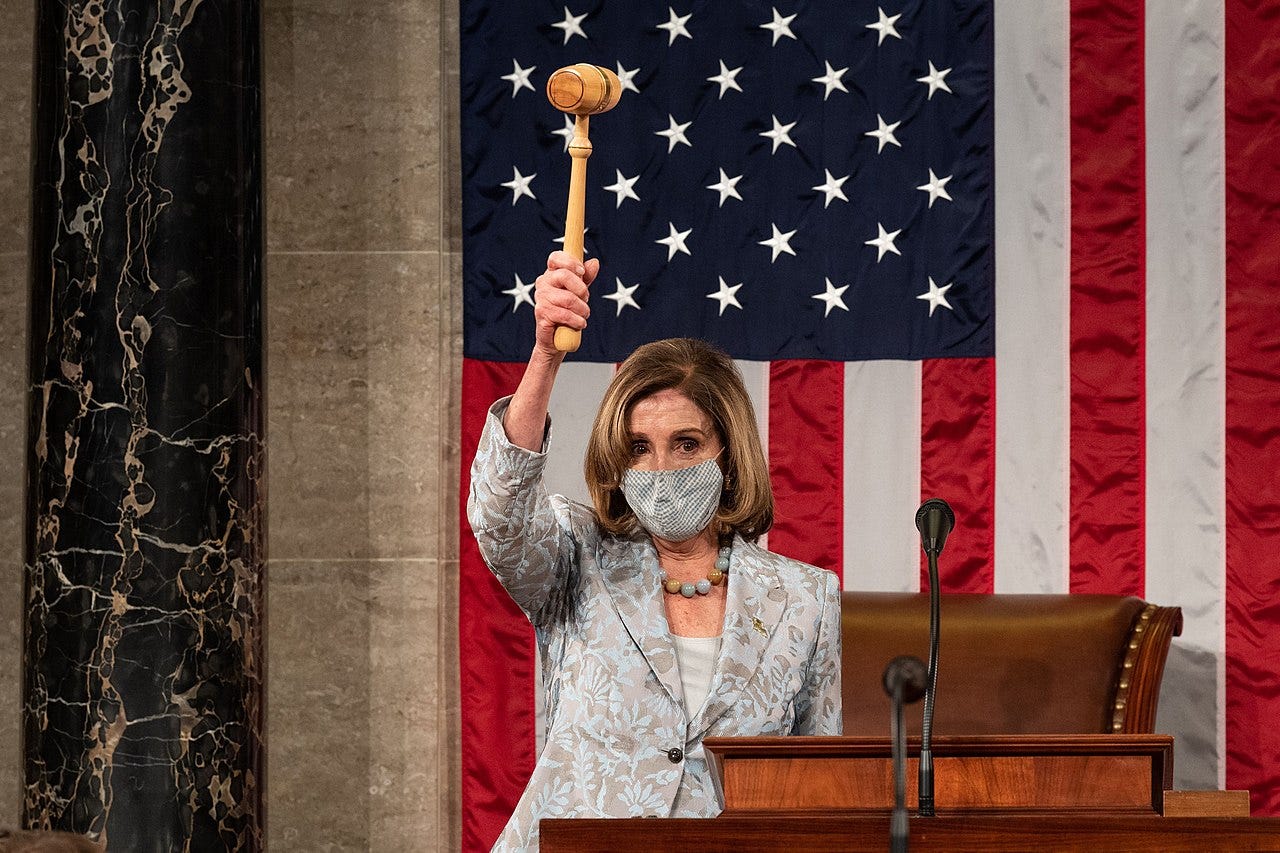Why Democrats will not save democracy.
Expecting the Democratic Party to stop America's slide toward fascism ignores both historical context and Democrats' inherent nature.
This article is related to those I’ve written about the collapse of American democracy, here and here, and the historical impact of the climate crisis, here.
I’m getting a little weary of journalistic and pundit-driven takes on the crisis of American democracy. Every couple of weeks—or days—there’s a new one, bemoaning the sorry state of our constitutional republic, especially since the January 6 insurrection, and warning that this is “our last chance” to save democracy before right-wing authoritarianism consumes and cancels it. The more explicitly political of these takes usually ends with an admonition of Democratic politicians, institutions or voters: “Wake up and fight for your democracy before it’s too late!” Here’s another one, by Zack Stanton of Politico, which itself is a riff off a Washington Post piece by Robert Kagan arguing much the same thing. I suppose this is progress in a sense. At least major media journalists are waking up to the fact that American constitutional democracy is inches from being extinguished. But these pundits are still engaged in a relatively shallow and two-dimensional analysis of the problem. Most political journalism fundamentally sees political events in America through the old and stale “horse race” paradigm of writing about and reporting on politics. In this paradigm the question is always the same: which party is winning the “race”? This view is reductive because it’s hard for its adherents to see the “race” in a larger historical context. The pundits are right that the race is broken, but all I really see them doing is hoping that the political process will hurry up and heal itself in time to preserve what’s left of our Constitution.
As I see it, that is simply not going to happen. Democrats and traditional political opposition to the Republican Party are not going to step up and save us from the coming wave of right-wing authoritarian fascism, because we are now outside of the parameters of the system where that’s how political control is decided, or we soon will be. Yes, Joe Biden defeated Donald Trump in the 2020 election, and Democrats nominally control both houses of Congress. But this may be nothing more than a slowdown on the road to authoritarianism, not a reprieve from it. As the 2020 election showed, there’s still enough check and balance left in the system to prevent imminent collapse. But 2020 also showed that the reserve of that stability is drawing ever thinner. When Liz Cheney and Mike Pence—Mike Pence, for God’s sake!—are all that stand between our Constitution and an authoritarian coup, this leaves little hope that a real opposition party will suddenly wake up and decide they want to get in the game, which is what pundits like Stanton and Kagan seem to be hoping, but also realizing is unlikely.
The main strength of Democratic politicians, and the vast majority of voters who lean toward them, is that they believe in democracy and the integrity of the system. Unfortunately, the main weakness of these same politicians and voters is that they believe in democracy and the integrity of the system. Republicans no longer do. Respecting what they see as the rules of the game and the norms of a democratic (small-d) society is deeply ingrained in politicians like Joe Biden, Nancy Pelosi and even “radicals” like Bernie Sanders, who are actually pretty far from “radical” despite what the media labels them. As a result, they’re constrained by fealty to these principles, which is a constraint that right-wing authoritarian conservatives have abandoned and thus freed themselves from. Biden, Pelosi, Sanders et al. have not yet had to make the hard choice between betraying the integrity of the system and preserving the very existence of democracy. That choice is coming, and soon. When they face it, all indications are that they will choose to honor the integrity of the system, because that’s what they’ve always done, and it’s in their nature.

This is more, I think, than the simple political bromides, popular on the left, that Democratic politicians lack the instinct to “fight fire with fire” or that they “don’t want to win.” They do want to win, but the admission ticket to governing a democratic republic is the belief that winning isn’t everything—that you have to go the way the votes tell you to. This is, in fact, the highest law of democracy, the Prime Directive, if you will. If Joe Biden is voted out of office in 2024 (assuming he’s still around then), he will leave office peacefully, and he’ll probably shout from the rooftops about how much better a man this makes him than Donald Trump, who refused to accept the result of an election that went against him. If Biden ever has to deploy tanks in the streets or call out the 82nd Airborne Division to protect his Presidency—and he might well have to do that—you can be assured that he will only do so if the legality and legitimacy of his continued right to be President is not open to question. He might fudge the Constitution in a minor way here and there in the service of the greater good, but the ultimate survival of that Constitution is the greater good that he believes he’s defending. That’s extremely commendable, and, in America, how legitimate leaders think and behave. Getting Joe Biden to abandon this principle is an absolute impossibility. But what if that’s not enough to save the republic?
Seen in a historical context, the United States has been sliding toward chaos and authoritarianism for much longer than silly Donald Trump has been a force in its politics. Our trajectory toward fascism has taken a three-steps-forward, two-steps-backward type of progression. The 2000 election, decided by the anti-democratic and frankly illegal meddling by a right-wing Supreme Court, was a major erosion of the democratic process. So too was the reaction to 9/11, the Iraq War and the presidency of George W. Bush. Those were three steps toward authoritarianism. In 2008 and 2012 we elected and re-elected Barack Obama, who worships even more fervently at the altar of the democratic process than Biden does; those were the two steps back. Then Trump came, and with him the final phase of the radicalization of the GOP, the abandonment of political ideology to a cult of authoritarian personality, the 2020 election and the January 6 coup attempt. Three more steps toward the abyss. Biden was elected—perhaps one-half step back—but there has been no sustained effort to unroot the seeds either of Trump’s 2016 victory or the poisoned fruit he planted while President. The next move will undoubtedly be a step forward toward fascism. Whether it puts us over the line once and for all is anyone’s guess; my personal prediction is that it probably will. It may not even be in the person of Trump, who will not likely live much longer anyway due to his many pathological and physical illnesses.
The U.S. Constitution was created, after the warfare and upheaval of the revolution and the confusion of the Articles of Confederation period, as an institutional means to solve the questions of political governance in the United States without resorting to violence. Instead of armies representing political or social factions fighting it out on a battlefield, the Constitution, so the theory goes, shunts conflict into the arena of electoral politics or judicial combat. That system broke down once, in 1861, and in fairly short order we saw exactly what the Constitution was proposed as an alternative to: armies representing political factions fighting it out on a battlefield. Lincoln managed to regain control of the situation and put the chaos back in the Constitutional box, but only through force of arms and the bloody deaths of 700,000 people. The Civil War was caused because one faction within the country—those to whom preservation of slavery was the paramount goal—refused to abide by the system of the Constitution to settle political differences. In 1861, the pro-slavery South decided that killing large numbers of people was preferable to settling questions by political or judicial means. The unresolved questions of that long-ago conflict are, in many ways, the seeds of the next one. It’s no coincidence that many of the right-wing authoritarians who want to end our 250-year experiment in democracy carry and fetishize Confederate flags.

Like the vast majority of people in this country who are not right-wing authoritarians, obviously I wish we weren’t in this position. I wish we had done something substantive about the erosion of our democratic norms 20 years ago. I also wish there had been no George W. Bush, no Iraq War, no Fox News and no Donald Trump. But, in waiting for Democrats to “save our democracy,” that’s basically where we are right now: wishful thinking. Democrats will not give up on democratic norms, not even to save them. They just won’t do it. Wishing they would is like wishing a leopard to change its spots.
The header image of this article was created by me from public domain images. All other images are also public domain so far as I am aware.
☕ If you appreciate what I do, buy me a virtual coffee from time-to-time to support my work. I know it seems small, but it truly helps.
🎓 Like learning? Find out what courses I’m currently offering at my website.
📽 More the visual type? Here is my YouTube channel with tons of free history videos.
💌 Feedback to share or want to say hello? Hit reply on this email or leave me a comment on Substack.




